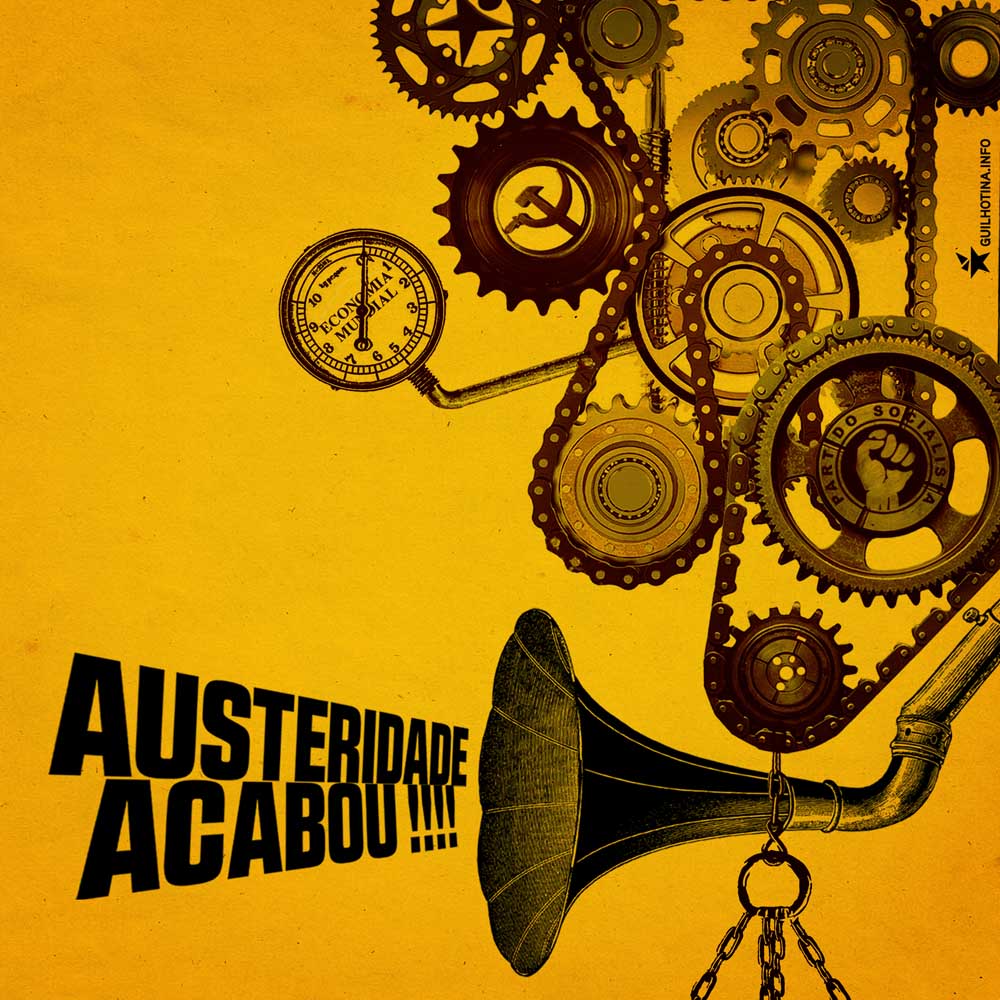Portugal // The legacy of the Contraption – Eternal austerity~ 6 min

This is one of four articles we’re going to publish about the legacy of the “Contraption” (Geringonça). These articles are mostly aimed at our external audience, which many times gets a completely erroneous idea of the supposed “economic miracles” happening in the country, when in fact we are still firmly in the hands of the good old neoliberal center (and the national debt creditors). For those unfamiliar with Portuguese politics, a few basic notions to keep in mind relative to the entities referred to in the article:
Contraption – The nickname of the government formed by the Socialist Party, with parliamentary support from the Left Bloc and the Unitary Democratic Coalition (Portuguese Communist Party and the Ecologist Party “The Greens”). Initially a derogatory term, it kind of stuck and is now somewhat ambiguous. Governing since 2015, with new elections scheduled for October 6.
Socialist Party (PS) – One of the two neoliberal center parties that alternate in power. The gentler face of capital, with the Social-Democratic Party acting as its foaming at the mouth counterpart. The name is a historical artifact from the post 1974 revolution period, when capital needed to promote a more “moderate” force to pull the rug from under the more revolutionary parties. Pushing the country right ever since.
Social-Democratic Party (PSD) – As described above, the B side of the neoliberal center. For those times when capital loses its patience and vast privatization and austerity programs need to be forcefully implemented while keeping a sociopathic facade of pious suffering for the “sacrifices of the Portuguese families”. Usually cooperates with CDS; the government preceding the Contraption was a coalition between these two parties.
Democratic Social Center (CDS) – Like PS, CDS also has a funny story involving the 1974 revolution. The funny part is that they used to be fascist collaborators that suddenly discovered the virtues of democracy and humanism after the revolution. Shares an umbilical cord with the Catholic Church and the charity mafia. The kind of party that appeals to the brick-stupid rural bourgeoisie and the petty bourgeoisie that goes into apoplexy anytime anyone tries to touch their risible private property. If you know a landlord that would push an old lady down the stairs just so he could charge an extra 100€ from the next tenant, odds are he would be a CDS voter.
Left Bloc (BE) – A bloc of minor left parties that lives mostly on chasing media coverage. Its support base is the cosmopolitan petite-bourgeois and labor aristocracy suffering from a guilty conscience. Concerned with civil and human rights and absolutely convinced that “the State is all of us”.
Unitary Democratic Coalition (CDU) – A coalition between the PCP and the Ecologist Party “The Greens”. The latter is usually described as the watermelon party – green on the outside, red inside.
Portuguese Communist Party (PCP) – One of the most organized and responsible governing forces in Portugal, or at least its political adversaries keep saying so – the question remains if that is a good thing. Works in tandem with the biggest national trade union confederation, CGTP. Its inaction or inability to halt the degradation of the living conditions hasn’t exactly helped it capture the working vote.
People, Animals, Nature (PAN) – “Neither left nor right” party, for veganism and animal rights. Recently entered parliament. Shares its support base with the Left Bloc, which explains why they are always sniping at each other. What happens when the middle class sheds its guilty conscience and opts instead to embrace misanthropic ennui.
By Luísa Branco and Nguyen
We have turned the page on austerity. It’s behind us. So claims the propaganda. But is that true? On January 2016, PS (Socialist Party), CDU (a coalition between the Communist Party and the Green Party), BE (Left Bloc) and PAN (the “other” Green Party) voted to restore four public holidays that the previous PSD (Social-Democratic Party) / CDS (Democratic Social Center) government had extinguished. Four more rest days, for those who aren’t forced to work on holidays. In 2018, the personal income tax (IRS) surtax was abolished. It had been put into place by the PSD / CDS government. And that’s about it.
On the other hand, we have the non-priorities, the cuts deemed not important enough to merit a second look by the Contraption. These are policies approved by the PSD / CDS duo, but which PS, CDU and BE decided to keep. Among them is the reduction in compensation payments for being laid off.
The amount was previously the equivalent of 30 days of salary (without benefits), per working year. It was reduced to 20 days of salary (without benefits), per working year. In 2012 the unemployment benefit time extension was reduced from 450 days to 360 days. The same law decree stipulates the terms and conditions required to request a time extension in unemployment benefits, although this extension pays less than the original. After claiming 6 months of this benefit, there is a 10% payment cut. In 2018 this 10% extra cut was withdrawn.
Along with unemployed people, pensioners were also a target for austerity. Between 2005 and 2015, several cuts were introduced for higher income retirement pensions. These are still in place, although the cuts were reduced. Between 2005 and 2015 there were both PS and PSD / CDS governments. The PSD / CDS coalition tried twice to prevent Christmas and vacation bonuses being paid to pensioners, but the Constitutional Court prevented this. The retirement age was increased, using higher life expectancy as an excuse. In 2013 the increase was aggravated. The Contraption government won’t revert these changes.
Salaries were also targeted. In 2012, overtime payment was cut in half. The first hour of overtime is now worth only 25% more than regular pay, and 37,5% in subsequent hours. Holidays overtime gets a 50% increase. During the PSD / CDS government the number of people earning minimum wage more than doubled, from around 400 thousand people, to almost 1 million. In April 2019 there are still 756 thousand workers on minimum wage, not even close to the existing 400 thousand of 2014. The average salary was also affected. Between 2010 and 2015, the average salary increased by 14€. This increase rose to 30€ by 2017. Predictably, the free market didn’t keep up with the minimum wage increase, which is now catching up with the average salary.
In 2013, meal allowances became taxable for amounts above 4.27€ per day. Previously it was only above 5.12€ per day. However, companies are offered the possibility of evading taxation with the creation of meal cards. If paid by card or meal voucher, the minimum value taxable is much lower, only if above 6.83€. Since 2017 these cards have allowed the growth of tax evasion, with the taxable amount being just over 7.23€ per day. This amount remains the same as of 2019. Such card payments have become widespread as a means of disbursing bonuses and benefits. Up until 2018, these payments did not even have to be reported to the Tributary and Customs Authority.
These meal cards and vouchers can only be used in specific establishments. Supermarkets, restaurants and other businesses where food is sold. For many, it is the return of the “company store”. It can’t be used for other mandatory monthly expenses, like rent, electricity, water, transportation, clothing, etc. as it could before. It is clearly a restriction on the use of the worker’s salary, imposed by the bosses.




